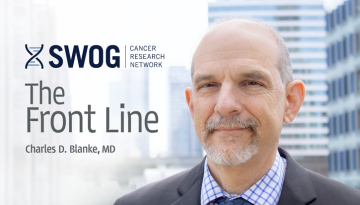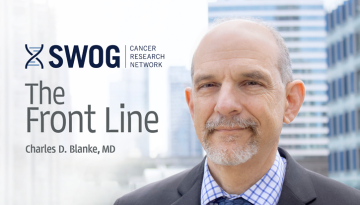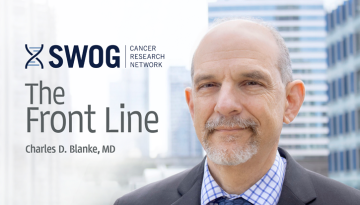S1712 Reports Better Response Rate in CML
Primary results of SWOG's S1712 clinical trial in chronic myeloid leukemia (CML) will be presented next week in Prague, at the European School of Haematology's 26th Annual John Goldman Conference on CML.
Kendra L. Sweet, MD, of the Moffitt Cancer Center, who led the study, will deliver the results at the conference’s first scientific session, one reserved for the handful of top-scoring abstracts submitted for the meeting (in fact, I’m told the S1712 results abstract was the top-scoring abstract submitted, so props to the study team!).
In chronic phase CML, it’s thought that the bone marrow microenvironment provides a protective niche for leukemic stem cells. This can help make them resistant to standard treatment with tyrosine kinase inhibitors (TKIs), which can mean lingering minimal residual disease and potentially lead to relapse.
The S1712 study team hypothesized that the drug ruxolitinib would alter the bone marrow microenvironment to make these stem cells more susceptible to TKI-induced apoptosis.
They designed the phase II S1712 with a straightforward schema – patients with chronic phase CML who had molecular evidence of disease even after at least 12 months of single-agent TKI therapy would continue their TKI, with one-half of them randomized to receive the addition of ruxolitinib. Patients would undergo regular testing to assess molecular response (MR). The primary endpoint would be the rate of MR4.5, a score that indicates a complete molecular response, after 12 months of treatment.
The S1712 results? Among the 75 eligible patients enrolled, the rate of patients scoring MR4.5 by 12 months was significantly higher on the ruxolitinib arm versus on TKI-only – 14 percent versus 3. The rate of patients scoring MR4.0 (considered a deep molecular response) by 12 months was also significantly higher on the investigative arm – 46 percent versus 26.
A deep molecular response can mean a patient is able to safely stop TKI treatment, and S1712’s investigational combination was better by this measure as well. Two years after randomization, the proportion of S1712 patients who met the National Comprehensive Cancer Network guidelines criteria for being able to discontinue their TKI treatment was 29 percent on the ruxolitinib arm versus 11 percent on the control arm (further details are in our press release).
Members of the team are now working to determine which patients are most likely to benefit from adding ruxolitinib to their TKI treatment, and further research is needed to determine if the combination can help us get even more patients with CML to the point of treatment-free remission.
Re-Engineering Group Correlative Science
Learning which patients are most likely to benefit from the S1712 combination will likely require detailed analyses of biospecimens contributed by patients who enrolled to the trial.
Just out in the Journal of Clinical Oncology is a position paper I coauthored with my fellow group chairs, which presents some ideas on how we can make these and other analyses of our banked biospecimens easier to conduct and to fund.
Titled “Correlative Science in the Cooperative Group System—Re-Engineering for Success,” it outlines a route to a better future for cooperative group translational research. The groups have issued a joint press release to help spread word of the paper.
We propose specific changes to lower the barriers researchers now face in accessing and using biospecimens from our trials. We also detail an approach to bringing badly needed additional funding to this research – a model for public-private partnerships.
Over the decade-long history of our Lung-MAP master protocol, we’ve worked under a public-private partnership with significant success (summarized last year in a Clinical Cancer Research paper), so we know it’s a viable model in the cooperative group context.
Please take a look at the new JCO position paper. I’d love to hear your thoughts. And congrats again to the S1712 team!
Other Recent Stories



